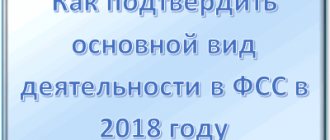Entrepreneurship
The Federal Tax Service Inspectorate is notified of planned activities when submitting an application for registration of an individual entrepreneur. OKVED data is assigned by the tax office and entered into the Unified State Register of Individual Entrepreneurs. Information, along with other information about individual entrepreneurs, will be freely available to interested parties.
Information is issued from the state register by generating an extract. The individual entrepreneur himself can obtain brief information about the company and provide the data to partners. Parts of the counterparties' statements must be submitted (banking sector). Partners can independently obtain information from the register if they contact the Federal Tax Service to receive paid services.
After registration and entering data on OKVED into the Unified State Register of Individual Entrepreneurs, the information is transferred to the statistical authorities to register the entrepreneur with statistics. The institution acts as a custodian of information and issues certificates of assigned activity codes. The document is generated by the institution in the form of an information letter and is often used by the entrepreneur in the course of conducting business.
Assigning and changing activity codes
Data on the codes of planned types of activities are entered into the application in the established form when completing the application. An unlimited number of OKVED codes can be entered into the document for registration of individual entrepreneurs, form P21001. An exception is the type of activity that requires licensing or special reporting. To avoid misunderstandings, such indices (in the absence of plans for their use) should not be included in the list.
The first of these codes acts as the main form, in relation to which the others will be used as additional forms.
The choice of type of activity is made according to the OKVED directory. The business direction chosen as the main one with the code indicated on the first line of the application may not have a predominant volume of turnover or revenue. If an individual entrepreneur considers a direction a priority, pays attention to its development and conducts active business in a narrow sector with development prospects, his actions are legal. The determination of the main code is made by the entrepreneur based on a subjective approach.
Data about the main code is traditionally indicated:
- In reporting submitted to the Federal Tax Service and funds.
- When registering the tariff for insurance premiums paid to the Social Insurance Fund. The rate is set or confirmed annually.
- Client card used to inform partners. The document is not an official form, but is often needed to establish contact with new partners.
- When specifying data in contracts in the part containing the details of the entrepreneur. Information is entered at the end of the agreement when describing the counterparty.
- In other situations requiring the provision of information about the basic details of the individual entrepreneur.
In the course of doing business, an entrepreneur can change the direction of activity or introduce new forms. When the emphasis on activity codes changes, it is allowed to indicate a non-main index in documents without making changes to the constituent forms. The legislation does not prohibit the use of any of the codes as the main one.
In the process of business development, the need arises to add activities. You can enter new codes and remove irrelevant ones through the registration authority, for which you need to submit an application P21001 with data adjustments. There is no charge for changing information.
How many OKVED codes can be indicated in the application?
As much as you like, it is not forbidden to include at least the entire classifier in the application (the only question is how much you need it). In the sheet where OKVED codes are indicated, you can enter 57 codes, but there can be several such sheets, in this case the main type of activity is entered only once, on the first sheet.
Please note that if the OKVED code you have chosen relates to the field of education, upbringing and development of children, medical care, social protection and social services, children's and youth sports, as well as culture and art with the participation of minors, then you will need to attach a certificate of registration to the application for registration absence of a criminal record (clause 1(k) of article 22.1 of law No. 129-FZ). The document is submitted upon an interdepartmental request, but in order not to delay the registration process, you can, after checking with the registration inspection about this possibility, request a certificate in advance.
The law stipulates this requirement only for individuals (that is, individual entrepreneurs), and when registering an LLC such a certificate is not required.
Requirements for the use of activity codes
Those responsible for keeping records of individual entrepreneurs have an opinion that activity codes are unimportant. During inspections, the inspectorate rarely pays attention to the codes indicated in the declarations in the absence of significant violations in taxation. The individual entrepreneur is not responsible for conducting activities in the event of inconsistencies in data according to OKVED.
Codes specified in the registry that do not correspond to reality and requirements may occur:
- When registering. Incorrect codes may be entered into the application with subsequent assignment of individual entrepreneurs.
- In the process of conducting business. An entrepreneur can make a change or change the direction of business without adjusting the codes in the state register.
There are types of activities in which the selection of codes must be approached with particular care, for which it is necessary to make timely adjustments.
The correspondence of indexes between documents and actual activities is important in some cases, which requires a careful approach:
- Conducting foreign economic activities.
- Planning to obtain a license. An entrepreneur will be refused to review documents if the data does not match.
- If there is a need to join a self-regulatory organization in the construction and design fields of activity. The accuracy of the data is verified during the documentation review stage. SRO companies have come to replace licensing, which determines the requirements for paperwork.
- Planning participation in public procurement or tenders. If there are no codes that meet the tender requirements, the individual entrepreneur will not be allowed to participate in the tender.
Attention! There are situations in which tax inspectors study the OKVED forms assigned to individual entrepreneurs.
Examples of selecting OKVED codes depending on the chosen field of activity
The applicant’s idea of the proposed activity codes does not always coincide with the logic of the structure of the OKVED classifier. For example, it is understandable when it comes to activities related to the rental of apartments and offices. The following OKVED codes are suitable:
- 68.20 Rent and management of own or leased real estate
- 68.20.1 Rent and management of own or leased residential real estate
- 68.20.2 Rent and management of own or leased non-residential real estate
Also, quite logically, activities related to trade or the provision of taxi services are structured. But, for example, a designer associated with Internet advertising can work under the following OKVED codes:
- 18.12 Other types of printing activities
- 74.20 Activities in the field of photography
- 62.09 Activities related to the use of computer technology and information technology, other
- 73.11 Activities of advertising agencies
- 73.12 Representation in the media
- 90.03 Activities in the field of artistic creativity
- 90.01 Performing arts activities
- 62.01 Computer software development
As you can see, when selecting suitable OKVED codes, it is not always possible to limit yourself to one class or classifier group. We recommend that you use a special selection of OKVED codes by type of business:
Ready-made sets of OKVED codes by type of business
Problems with the Federal Tax Service and the Social Insurance Fund
When choosing indexes, data with a high degree of professional risk is not entered into the application document if the individual entrepreneur does not operate on them. There is a possibility that the Social Insurance Fund will use data that is unfavorable for individual entrepreneurs when calculating deductions for contributions from industrial accidents.
Difficulties may arise in interactions with the Federal Tax Service on taxation. Inconsistency between codes and types of activities leads to inconsistencies in the following cases:
- Application of the taxation regime in the form of UTII. If the documents do not contain the appropriate code, the inspectorate may refuse to accept the declaration or require additional forms to be submitted under the general taxation system.
- The need to use VAT deductions and reimburse amounts from the budget. Based on the discrepancy between the code of the activity used and the purpose of the deduction, tax inspectors during a desk audit may refuse to receive amounts from the budget.
If there are obligations to pay VAT, the entry of codes in the register must be approached responsibly. Tax inspectors especially carefully check counterparties when interacting with tax deductions.
During the verification process, the following is analyzed:
- Documents involved in determining the taxable base and VAT deduction.
- Counterparties involved in the supply and acquisition of goods and materials.
- Data about partners specified in contracts.
- Information about suppliers listed in the state register.
The presence of a common electronic database allows tax inspectorates to receive information without paperwork and additional requests. The speed of receipt of data makes available information about the OKVED of counterparties throughout the chain. If any of the organizations or individual entrepreneurs have inappropriate data, the deduction may be denied.
In the practice of inspections by the Federal Tax Service, there are cases of denial of partial or full deduction for VAT. Decisions are challenged in court proceedings. Before receiving a positive court decision, the entrepreneur must pay the arrears and tax penalties. The amounts will be returned in the future, but at the time of payment they are diverted from the business, which does not play a positive role in the development of the company.
An entrepreneur, using special areas of business that require careful selection of codes, must adjust the data to avoid losses.
What the law says about the use of incorrect OKVED
The main law regulating the procedure for presenting data entered into the constituent documents initially and in the event of any changes is the Federal Law of 08.08.2001. No. 129-FZ. The Law establishes the obligation to submit data about an entrepreneur to the state register. If there are changes in the individual entrepreneur’s documents, they must be reported to the Federal Tax Service within three days. The entrepreneur’s data included in the Unified State Register of Individual Entrepreneurs includes:
- Personal information about the entrepreneur indicated in the passport.
- Information about the main identification document – the passport of an individual.
- Data on permanent or temporary registration of a person on the territory of the Russian Federation.
- Number and date of entry in the state register.
- Information about entrepreneur licensing.
The list of mandatory data on individual entrepreneurs established by law is a closed list and does not contain a requirement to enter activity codes. Based on the provisions of the law, an entrepreneur is not obliged to make adjustments to the state register data according to OKVED codes when changing types of activity.
In paragraph 5 of Art. 5 of Law No. 129-FZ states that a legal entity or individual entrepreneurs must notify the registration authority within 3 days. Violation of the requirement entails punishment under Art. 14.25 Code of Administrative Offences.
Attention! The Code of Administrative Offenses contains an article on punishment for late provision of individual entrepreneur information contained in the state register, if this is provided for by law. Information about current OKVED is not included in the data on which information should be provided. There are no violations of legal provisions.
Individual entrepreneurs have the right on the basis of Art. 49 of the Civil Code of the Russian Federation to conduct any economic activity not prohibited by law. If changes occur in OKVED, the entrepreneur has the right not to adjust the register and continue to conduct business without violating the law. Data on the types of planned activities are entered into the register when registering an individual entrepreneur. In the absence of further adjustments, liability does not arise.
OKVED 2014 came into force: Video
https://youtu.be/MYFrEp8lSJ0
As you know, when registering, organizations and entrepreneurs indicate in the appropriate application (forms 11001 and 2100) the proposed types of activities. Information about them is entered in or in the form of codes according to
However, life does not stand still. And in the process of doing business, organizations and entrepreneurs are often faced with the need to change (sometimes radically) the direction of their activities. At the same time, many of them begin to engage in a new type of activity without taking care to change existing ones or add new codes to the corresponding state register. Indeed, why? After all, the fact that the required code is not in the list of initially declared ones does not mean that this type of activity cannot be engaged in. And in general, these codes are needed only to generate summary official statistics, so that government agencies can imagine what the organization or individual entrepreneur intends to do. That’s how it is.
Meanwhile, the obligation to promptly (within 3 working days from the start of a new activity) to notify the registering Federal Tax Service about changes in codes is directly established by the Law. And for its failure to comply, administrative liability is provided for the head of the organization (entrepreneur) - a warning or a fine. True, you don’t have to be afraid of a fine. After all, firstly, the tax authority must manage to detect a violation within 2 months and 3 days from the start of a new activity. Otherwise, no sanctions can be imposed. Secondly, it is not established anywhere what is meant by the start of an activity.
Still have questions?
Dear readers! Our articles talk about typical ways to resolve legal issues, but each case is individual.
If you want to find out how to solve your particular problem, please use the form just below ↓ or use the online consultant at the bottom right! →
Each company and entrepreneur has OKVED codes declared in the Unified State Register of Legal Entities and Unified State Register of Individual Entrepreneurs. If the activity changes during the work, then you need to check whether a code is declared in the registry that corresponds to the new specifics. If not, then you have three working days from the date of commencement of such activities to submit an application for changes (Clause 5, Article 5 of the Federal Law of August 8, 2001 No. 129-FZ).
The fine for being late is 5,000 rubles. (Part 3 of Article 14.25 of the Code of Administrative Offenses of the Russian Federation). It is issued to the head of the company. True, in practice this happens extremely rarely. Other consequences are much more dangerous - regarding taxes and contributions.
Activities without okved
As a result of the analysis of information about codes of types of economic activity (hereinafter referred to as OKVED codes) contained in the Unified State Register of Legal Entities (both in the subsystem of the Centralized Registration System AIS “Tax-3” (hereinafter referred to as the CSR) and in the federal database (FBD) of the Unified State Register of Legal Entities) , the following was revealed.
The Unified State Register of Legal Entities contains information about more than 447 thousand legal entities that have not ceased their activities in the prescribed manner, information about which does not contain OKVED codes, including codes for the main type of activity.
Moreover, of the specified number of legal entities, more than 19 thousand were registered after January 1, 2004, of which 1072 legal entities were registered in 2014 - 2020.
The lack of information about OKVED codes in the Unified State Register of Legal Entities leads to the incorrect formation of statistical reporting form N 1-NOM “Accrual and receipt of taxes and fees to the consolidated budget of the Russian Federation for the main types of economic activity” due to the fact that a significant part of the receipts is reflected in the “Tax amounts” and fees not distributed according to OKVED codes.”
In addition, cases of lack of information about legal entities in the Central Social Register were identified if they were available in the Unified State Register of Legal Entities or in the Unified State Register of Legal Entities if they were available in the Unified State Register of Legal Entities.
ConsultantPlus: note.
The application is not provided.
Information about the specified legal entities and the listed cases of lack of information is reflected in the attachment to this letter.
At the same time, it is necessary to note the following.
In accordance with the Requirements for the execution of documents submitted to the registration authority, approved by order of the Federal Tax Service of Russia dated January 25, 2012 N ММВ-7-6 / [email protected] “On approval of forms and requirements for the execution of documents submitted to the registering authority during state registration legal entities, individual entrepreneurs and peasant (farm) enterprises" (registered with the Ministry of Justice of Russia on May 14, 2012, registration number 24139), the application for state registration must indicate codes according to the All-Russian Classifier of Types of Economic Activities OKVED OK 029-2001 (NACE Rev. 1).
At the same time, in violation of the above requirements in the documents submitted to the registering authority during state registration, there has recently been an increase in cases of entering into the Unified State Register of Legal Entities information about OKVED codes according to the All-Russian Classifier of Types of Economic Activities OK 029-2014 (NACE Rev. 2) (hereinafter - OKVED2), which leads to incorrect reflection of information about the types of activities of a legal entity (only OKVED codes are indicated without their names).
Please note that the use of OKVED2 for state registration of legal entities is provided for from January 1, 2016.
Taking into account the above, in order to update the information contained in the Unified State Register of Legal Entities, the departments of the Federal Tax Service of Russia for the constituent entities of the Russian Federation are instructed to:
1) ensure, in relation to legal entities registered after January 1, 2004, the entry of information about OKVED codes, including codes for the main types of activities in the Unified State Register of Legal Entities (both in the Central Social Register and in the FBD Unified State Register of Legal Entities);
2) consider the possibility of excluding legal entities registered before January 1, 2004, the information about which does not contain OKVED codes, from the Unified State Register of Legal Entities in accordance with Article 21.1 of the Federal Law of August 8, 2001 N 129-FZ “On State Registration of Legal Entities and individual entrepreneurs." In the absence of such an opportunity, organize activities aimed at entering information about OKVED codes into the Unified State Register of Legal Entities in relation to these legal entities;
3) ensure synchronization of the CSR and the FDB of the Unified State Register of Legal Entities;
4) exclude, during the state registration of legal entities, cases of failure to enter OKVED codes into the Unified State Register of Legal Entities, as well as, until the appropriate instructions from the Federal Tax Service of Russia, the entry of OKVED2 codes into the Unified State Register of Legal Entities.
Work on updating information about OKVED codes should be completed by December 15, 2020.
The Federal Tax Service of Russia will conduct subsequent assessments of the results of the implementation of this instruction based on the analysis of the Unified State Register of Legal Entities on October 8, November 8 and December 18 of the current year. The results of the work will be taken into account when preparing proposals for analytical points when assessing the activities of the departments of the Federal Tax Service of Russia in the constituent entities of the Russian Federation for the purpose of material incentives.
Valid
state councilor
Russian Federation
3 classes
D.Yu.GRIGORENKO
How discrepancies in the type of activity and OKVED code affect taxes
Ideally, OKVED codes in the Unified State Register of Legal Entities should clearly correspond to your transactions. Both missing and unnecessary activities can lead to annoying tax consequences. Especially if you use a special mode.
Refusals for VAT deductions
If the OKVED code does not correspond to the type of goods purchased, then inspectors can deduct VAT. For example, inspectors ask: why does a company need an airplane if its declared OKVED codes do not imply the use or sale of such transport? Of course, such claims arise when the cost of the issue is quite high. And even more annoying.
Fortunately, justice can be restored in court. After all, a specific code in itself is not a basis for refusing a tax deduction. And moreover, the legislation does not prohibit changing types of activities (resolution of the Federal Antimonopoly Service of the Volga Region dated April 26, 2012 in case No. A49-1563/2011). And if you are not in the mood to argue in court, then it is better to add the codes to the registry in advance, even before the transaction.
Extra reporting
Let’s say that the company’s activities are fully covered by imputation, the company regularly pays UTII. However, often in the Unified State Register of Legal Entities a company is assigned not only those codes that correspond to the imputed types of business. The list of declared activities may well include those OKVED values that fall under the general taxation regime.
Carefully!
On imputation, it is safer to remove from the Unified State Register of Legal Entities all types of activities that do not fall under this special regime. Otherwise, tax authorities may declare that taxes must be paid according to the general system.
Tax authorities may require declarations for all major taxes, in addition to the imputation report. That is, you will have to submit quarterly zero reports for VAT and income tax (letter of the Federal Tax Service of Russia dated April 26, 2011 No. AS-4-3/6753). Otherwise, inspectors will issue a fine (Article 119 of the Tax Code of the Russian Federation).
This position does not find support in the Russian Ministry of Finance. After all, if there is an exemption from taxes, then there is no need to report on them, officials believe (letter dated May 18, 2012 No. 03-11-06/3/34). But it’s still safer to remove unnecessary codes from the registry.
It is also dangerous to indicate the OKVED code in the declaration if it does not correspond to the tax for which you are reporting. For example, a company has not one, but several types of activities. One of them was converted to imputation, the other to simplified.
Common mistake
Accountants do not pay attention to the OKVED code on the title page of the declaration. It must be relevant to the activities for which you are reporting.
On the title page of the UTII declaration, you must indicate the OKVED code corresponding to the imputation. And in the simplified tax report there is an activity code that falls under the simplified tax regime. The main type of business does not matter (letter of the Ministry of Finance of Russia dated June 9, 2012 No. 03-11-11/186). If the codes in the reports are mixed up, then inspectors may charge additional taxes.
Prohibition on the use of special regime
You should not submit a notice of transition to a special regime if you have not declared the corresponding type of activity. Let's say a company wants to switch to UTII, submits a notification indicating the OKVED code, which is not in the Unified State Register of Legal Entities. Of course, auditors can easily refuse to switch to imputation. The same applies if an entrepreneur wants to apply a patent taxation system.
There is only one way out - to make changes to the Unified State Register of Legal Entities and add the necessary codes. But it's better to do this in advance. No less than five working days before submitting a notice of the special regime. After all, that’s exactly how long it will take to register new codes.
OKVED 2020 – selecting activity codes
Letter names of sections are not used in the formation of OKVED codes. The code is classified within the section in the following form (asterisks indicate the number of digits):
**. - Class;
**.* - subclass;
**.** - group;
**.**.*- subgroup;
**.**.** - view.
Here is an example of OKVED 2 code from section A “Agriculture, forestry, hunting, fishing and fish farming”:
- Class 01 – Crop and livestock farming, hunting and the provision of related services in these areas;
- Subclass 01.1 – Growing of annual crops;
- Group 01.13 - Growing vegetables, melons, root and tuber crops, mushrooms and truffles;
- Subgroup 01.13.3 - Growing table root and tuber crops with a high content of starch or inulin;
- View 01.13.31- Growing potatoes.
Such detailed code details (up to six digits inclusive) are not required to be indicated in the application. It is enough to enter the OKVED code within 4 digits, that is, only up to the type of activity group. If you specified a group of codes (that is, a code consisting of four digits), then the codes of subgroups and types automatically fall into it, so they do not have to be specified separately or supplemented later.
Example:
- Group 01.13 “Growing of vegetables, melons, root and tuber crops, mushrooms and truffles” includes:
- 01.13.1: Growing vegetables;
- 01.13.2: Growing melons;
- 01.13.3: Growing table root and tuber crops with a high content of starch or inulin;
- 01.13.4: Growing vegetable seeds, with the exception of sugar beet seeds;
- 01.13.5: Growing sugar beets and sugar beet seeds;
- 01.13.6: Growing mushrooms and truffles;
- 01.13.9: Growing vegetables not included in other groups.
If you indicated the OKVED code 01.13, then, for example, growing vegetables and growing mushrooms and truffles are included in this group, so it is not necessary to indicate them separately as 01.13.1 and 01.13.6, it is enough to limit yourself to the code 01.13.
What problems may arise with contributions?
The rate of contributions for injuries depends on the main type of activity of the organization or entrepreneur. And some companies, depending on the OKVED code, can count on reduced insurance premiums.
Increased rates for injuries
Every year, before April 15 inclusive, you must submit information confirming your main type of activity. As a rule, this requires an application, a confirmation certificate and a copy of the explanatory note to the balance sheet for the previous year. If this is not done, the company will set a maximum rate of contributions for injuries. Let me explain.
According to the data that you submit to the Social Insurance Fund, social insurance auditors determine the class of professional risk in your company. Each of these classes has its own contribution rate for injuries. Accordingly, the higher the risk class, the more you will have to pay (Classification approved by order of the Ministry of Labor of Russia dated December 25, 2012 No. 625n).
Without documents, inspectors will select the OKVED code with the highest risk class from those you declared in the Unified State Register of Legal Entities.
You will be notified in writing of the new tariff by May 1st. If it differs from the previous one, then contributions will have to be recalculated from the beginning of the year and the reporting corrected (clause 5 of the Procedure approved by order of the Ministry of Health and Social Development of Russia dated January 31, 2006 No. 55).
To be fair, we note that this approach of the FSS is not entirely legal. The judges of the Presidium of the Supreme Arbitration Court of the Russian Federation confirmed a couple of years ago: auditors do not have the right to assign the highest risk class if the company has not disclosed its main type of activity (resolution of July 5, 2011 No. 14943/10).
However, if you do not want to argue with the FSS, you must confirm the type of activity on time. And just in case, it’s better to reconsider the codes you stated. Among them, are there those that correspond to high risk classes and are definitely unnecessary? Then it is safer to exclude them from the Unified State Register of Legal Entities immediately.
Deprivation of rights to preferential contributions
Reduced rates of contributions to the Pension Fund and the Social Insurance Fund are entitled to be applied by simplified companies that produce certain goods and provide services. The full list is in subparagraph 8 of part 1 of article 58 of the Federal Law of July 24, 2009 No. 212-FZ.
Moreover, it is not at all necessary to declare such an OKVED code as the main one. The main thing is that the share of income from the sale of goods (services) for this type of activity is at least 70 percent of the total income. You indicate this value quarterly when preparing reports on the RSV-1 PFR form in subsection 3.6 of section 3. And in the FSS form-4 (valid from reporting for the first half of 2013), the OKVED code must be indicated in sections I and II. This way you confirm your right to apply for benefits.
However, if auditors of extra-budgetary funds discover that the code indicated in the reporting is not among those in the Unified State Register of Legal Entities (USRIP), then the contributions will be forced to be recalculated at the full rate.
Main activity according to OKVED
But here you need to be careful. The fact is that the calculation of contributions for workers for insurance against industrial accidents and occupational diseases occurs according to the tariffs for the main type of activity. The more risky (traumatic or provoking occupational diseases) the activity is, the higher the insurance premium rate.
Before April 15 of the year following the reporting year, employers must submit to the Social Insurance Fund documents confirming the main type of activity, in the manner prescribed by Order of the Ministry of Health and Social Development No. 55 of January 31, 2006. Organizations submit such confirmation annually, and individual entrepreneurs - employers only if they have changed their main type of activity. The main type of activity is considered to be the type of activity from which the income received is higher in comparison with the income from other activities for the previous year.
If confirmation is not submitted, then the FSS sets the highest tariffs of all types of activities specified by the policyholder, and this is where excessively specified OKVED codes can turn out to be very inappropriate.
What are the dangers of undeclared OKVED codes when working with contractors?
Not long ago, tax officials declared the discrepancy between OKVED codes and the actual activities of a company as a sign of unreliability. Today, companies are trying in every way to exercise caution and due diligence when choosing a counterparty and assess risks. And they conclude contracts only with those who have the least dangerous factors.
So you have one more reason to check whether all types of transactions are declared in your Unified State Register of Legal Entities. It is clearly not in the best interests of your company to have a lucrative deal turned down at the last minute.
- What are the consequences when carrying out the work of an individual entrepreneur not according to OKVED?
- Problems with the FSS
If an individual entrepreneur does not operate in accordance with okved, can this entail any punishment from regulatory authorities? An individual entrepreneur often asks this question. What will happen if he starts working without the codes that are determined by the All-Russian Classifier of Economic Activities, because it happens that a legal entity simply does not have time to receive them or does not report that there has been a change in its activity. Believing that the enterprise operates legally, having only changed the direction in which it worked, the entrepreneur is in no hurry to obtain a new code. But, despite this, he is obliged to inform the Federal Tax Service at the place of conduct of proceedings about a change in the type of activity.
This procedure is determined by the law “On State Registration of Legal Entities and Individual Entrepreneurs,” which clearly states that when a company operates and OKVED does not correspond to the activities of the individual entrepreneur, a fine of 5 thousand rubles can be imposed on the head of the enterprise. or issue a warning. Despite this, in order to have grounds to impose a fine for an entrepreneur conducting an activity not in accordance with the legal code or conducting a new activity from which he receives income for more than 2 months, the tax office still has to prove that a violation was committed.
Is it possible to carry out activities without an OKVED code?
An individual entrepreneur or LLC founder receives primary activity classifier codes (OKVED) upon registration.
The package of documents includes application form R-21001. It is there that the types of activities that will become priority or additional areas of work are indicated in the future. Each area of work in the document has its own numerical code, which must be indicated in the application. Physically, the P-21001 form includes 57 codes, but no one limits you here. You can fill out as many additional sheets as you like and attach them to the main document. Thus, it is impossible to start doing business without this requisite.
But what if the list you provided during registration is incomplete? Suppose you decide to “reformat” your business and leave, for example, from catering to auto repair services. Such career turns are indeed difficult to foresee, especially at the beginning of entrepreneurial activity.
The law does not prohibit a change of activity, but at the same time it obliges the controlling structures to notify about this in a timely manner. According to Federal Law No. 129, you must report this to the tax office within 3 days after starting work in a new direction.
Changes are recorded in the state registers of entrepreneurs or legal entities. If you suddenly forgot, did not have time or did not consider it necessary to report changes in the type of activity, then you will face a fine of 5,000 rubles (Part 3 of Article 14.25 of the Administrative Code). However, as tax experts say, it is extremely difficult to prove this violation, so sanctions are issued very rarely.
You must inform the tax office about your change of activity within 3 days after starting work in the new direction.
Sanctions for failure to provide information about a change or addition to the type of activity:
1. Refusal to provide a professional deduction on the main taxation system (OSNO).
Fortunately, there is a decision of the Supreme Court, which says that an entrepreneur has the right to receive deductions from all business income.
2. Refusal to apply the “simplified tax” and the requirement of a penalty under OSNO.
However, here too the courts are not on the side of the tax department. According to Art. 26.2 of the Tax Code of the Russian Federation, the use of “simplified” does not depend on the codes in the Unified State Register of Individual Entrepreneurs.
Some difficulties can also be expected from extra-budgetary funds. For example, you may be charged an increased insurance rate if you did not change your main and additional activities in time. But YOU also considered it illegal.
We can say that by ignoring regulatory authorities when expanding activities, an individual entrepreneur or legal entity risks little. Even if the Federal Tax Service manages to prove the fact of a violation, the fine that will be issued to you will be small. All tax authorities’ sanctions in other areas can be challenged and canceled by decision of the arbitration court. But think about it, is the game worth the candle? After all, it is much easier to make changes to documents in a timely manner and continue to calmly master new production or commercial areas.
What are the consequences when carrying out the work of an individual entrepreneur not according to OKVED?
Of course, paying a fine of 5,000 rubles is not the most pleasant thing, because, it would seem, for an individual entrepreneur the amount is small, but this is not the worst thing. Nevertheless, working without the required code threatens with the following consequences:
- The tax office may refuse to receive a VAT refund within the framework of activities for which there are no entries in the register.
- If, at the time of registration, the enterprise did not indicate the direction of activity from the OKVED list, then it was not registered as a tax payer according to the imputed type. Then the Federal Tax Service will note that the UTII declaration was not submitted on time, which means that the company will receive another fine and its current accounts will be blocked.
- Among other things, if an entrepreneur’s company’s activities are included in the list of imputed types, but in addition to them there are other types from the list of qualifiers, then the individual entrepreneur may receive a fine for not filing zero declarations.
- If an individual entrepreneur operates without OKVED, then when working for OSNO he may be denied a professional deduction for personal income tax for types of activities not listed in the register; in the case when an individual entrepreneur works on a simplified basis, he can simply be removed from it and transferred to the OSNO mode, as a result of which additional personal income tax taxes will be assessed, fines will be issued for late submission of required declarations, etc.
Return to contents
Problems with the FSS
Working as an individual entrepreneur without a qualifier, among other things, will bring problems associated with the Social Insurance Fund.
Firstly, if there are reduced rates for insurance, they will be waived. If the Social Insurance Fund is not notified of a change in the type of activity of the enterprise, then next year contributions will be paid at the highest rates without any benefits. He will also have to pay an increased rate in social security and for hired employees.
In addition, problems cannot be avoided with banks and clients, who usually study the company’s activities according to the register. The company will be treated with suspicion, as a result of which profits will decline, and banks will refuse to provide a loan, since the documents submitted for consideration for obtaining a loan will include profits that did not appear in accordance with the codes. Because of which the bank will treat such a client with suspicion, the individual entrepreneur will receive a refusal.
Is it possible to carry out activities not in accordance with okved? If you need problems, then yes. However, all fines and warnings spoil the image and reputation of the company, and this directly affects the profits received. Still, it’s worth spending a little time and effort declaring your change of activity to the relevant authorities. This will save you from a lot of problems in the future. And new clients are always more willing to contact a company that has a good reputation.
When it is necessary to make a change to OKVED, an individual entrepreneur must submit an application. For this purpose, a form is designed with the design of the sheet “F” - if you need to add a code, or “Z” - if you need to remove the code. The businessman also submits an application with sheet “I” or “K” if it is necessary to add or cancel a number.
Based on the fact that the law provides for fines and other punishments for conducting activities that do not comply with the OKVD, it is necessary to work according to the law, avoiding problems with various government services.
The basis for running a legal business in Russia is the timely and conscientious completion by the enterprise of all requirements established by the state. The company is first registered and then starts working. But what happens if a legal entity carries out activities without OKVED? What consequences may occur?
As such, there is no separate registration procedure for entering OKVED and obtaining special supporting certificates.
When registering with the Federal Tax Service, an enterprise submits along with the package information about what types of activities it will engage in.
According to the data specified in the application, new codes are recorded in the state register.
During the period of business, several situations may arise in which the company will be engaged in one type of business, and the documents will reflect irrelevant information:
- were not included in the application during registration;
- After registration, the company began to engage in another type of business, but did not change the codes in the registry.
Up to a certain point, such a discrepancy may have virtually no effect on the business operations of the company. The question of whether it is possible to carry out activities not in accordance with OKVD will arise:
- if the company makes a decision;
- during a tax audit.
In the first case, when submitting an application for participation, you must indicate the code that is entered in the Unified State Register of Legal Entities for this entrepreneur. If the official code specified by the company does not meet the bidding requirements, then such application will not be accepted. Losing contracts is a serious loss for a commercial company.
Financial consequences of activities not in accordance with OKVED
If it is established that the enterprise systematically received income by engaging in those types of business that are not in the constituent documents and are not included in the Unified State Register of Legal Entities, such income will be withdrawn from the general circulation of the legal entity and confiscated.
The basis for such actions on the part of the fiscal authorities is the enterprise’s conduct of non-statutory activities. This is financial responsibility for carrying out activities without OKVED. No other types of liability are provided for such a violation of the existing procedure for registering a business.
An enterprise has the right to enter and change information about its business in state registers at any time, while the Federal Tax Service does not impose a fine for activities without OKVED that were carried out before submitting registration forms.
Page not found
Hello, to the first question. Question: Is an individual entrepreneur required to obtain a new certificate of state registration if he intends to engage in an activity not specified in his certificate of state registration?
Answer: In accordance with paragraphs. “a” clause 1 art. 22.1 of the Federal Law of 08.08.2001 N 129-FZ “On State Registration of Legal Entities and Individual Entrepreneurs” (hereinafter referred to as Law N 129-FZ), upon state registration of an individual as an individual entrepreneur, an application for state registration signed by the applicant is submitted to the registering authority form approved by the Government of the Russian Federation. The application form for state registration of an individual as an individual entrepreneur was approved by Decree of the Government of the Russian Federation of June 19, 2002 N 439 (hereinafter referred to as Decree N 439). This application indicates all types of economic activities that will be engaged in by an individual registered as an individual entrepreneur. In this case, their name is indicated, as well as the corresponding OKVED code. In accordance with paragraphs. "o" clause 2 of Art. 5 of Law N 129-FZ, the Unified State Register of Individual Entrepreneurs contains such information about the individual entrepreneur as OKVED codes. In accordance with the Decree of the State Standard of Russia dated November 6, 2001 N 454-st, OKVED is intended for classification and coding of types of economic activities and information about them. OKVED is used to solve the following main problems related to: - classification and coding of types of economic activities declared by business entities during registration; — determination of the main and other actually carried out types of economic activities of economic entities; — development of regulatory legal acts relating to state regulation of certain types of economic activities; — implementation of state statistical monitoring by type of activity over the development of economic processes; — preparation of statistical information for comparison at the international level; — coding information about types of economic activities in information systems and resources, the unified state register of enterprises and organizations, and other information registers; — meeting the needs of government and management bodies for information on types of economic activities when solving analytical problems. By virtue of Art. 18 of the Civil Code of the Russian Federation, citizens may own property; inherit and bequeath property; engage in business and any other activity not prohibited by law. Clause 1 of Art. 23 of the Civil Code of the Russian Federation stipulates that a citizen has the right to engage in entrepreneurial activity without forming a legal entity from the moment of state registration as an individual entrepreneur. As explained by the Federal Tax Service of Russia in Letter dated September 26, 2005 N BE-6-09/ [email protected] , the legislation on state registration does not provide for the obligation in relation to legal entities, individual entrepreneurs and peasant (farm) farms to submit information about the types of economic activity to the registering authority. activities (OKVED code, name of the type of activity) in case of their absence in the Unified State Register of Legal Entities and the Unified State Register of Individual Entrepreneurs. Taking into account the above, it appears that the indication in the certificate of state registration of an individual entrepreneur of any type of activity does not deprive the individual entrepreneur of the right to engage in other activities not prohibited by law in accordance with the legislation of the Russian Federation. Thus, an individual entrepreneur should not receive a new certificate of state registration if he intends to engage in a type of activity not specified in his certificate of state registration. Additionally, we note that Law No. 129-FZ does not provide for the possibility of an individual entrepreneur obtaining a new certificate of state registration in this case. An individual entrepreneur must submit to the registration authority an application to amend the information about the individual entrepreneur contained in the unified state register of individual entrepreneurs. According to paragraphs. “a” clause 1 art. 22.2 of Law N 129-FZ, in order to make changes to information about an individual entrepreneur contained in the unified state register of individual entrepreneurs, an application signed by the applicant for making changes to the unified state register of individual entrepreneurs in the form approved by the Government of the Russian Federation is submitted to the registration authority. The application form for making changes to information about an individual entrepreneur contained in the unified state register of individual entrepreneurs is also approved by Resolution No. 439. This form provides for the possibility of making changes to information about types of economic activities.
L.L.Gorshkova Center for Accounting and Taxation Methodology 01/26/2009









